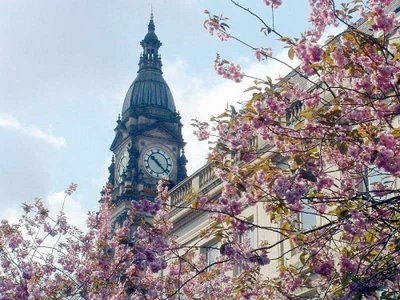THE PARTYGOERS
As Hunter dropped his last few Christmas cards into the station post box and reflected on the fact that all the loose ends of the year had been tied up, he savoured the prospect of the journey north. The feeling first stirred when he bought his ticket, usually around Hallowe’en – for he was a creature of habit. Now, waiting below the timetable at Kings Cross station, he read over the times and destinations with a feeling of immense pleasure. What freedom! He would spend seven hours on a train. Out of reach of mobile signals, owing nothing whatsoever to anyone, completely unavailable, with a weightless mind, he would abandon himself to the beguiling decades-old acid folk music he loved, and get intoxicated as fields and silhouetted rooftops raced by.
The rolling fog on the fields was as high as a person, or a house, and the patches of ice looked blue in the golden twilight. Hunter let his mind wander to Christmases past: the sweet smell of the gum and glitter he and his friends used to make pictures with as a child; the snow dripping from the red lettering of The Dandy; first kiss to Last Christmas; the costumed Holly King and Oak King battling it out on a snow-covered hilltop; choirs by candlelight… There was still a lot of magic around, even if it was all ultimately empty. He often felt as if he were the only one who felt it, marooned in the kind of innocent excitement and imagery that had been long ago dismissed by everyone else he knew as irrelevant to their responsible plods through adulthood.

“Hi, Hunter! Wow, haven’t seen you for ages. You’re looking well, mate. Help yourself to drinks – they’re in the kitchen.” Giles, tonight’s host, gesturing to the phalanx of bottles and cans in the kitchen, and moving off to join his colleagues in the front room.
Hunter looked around for somewhere to put down the plastic bag that contained his present. Now didn’t seem as if it was the right moment. He filled a glassful of wine, took a deep breath and walked towards the door, from which he could hear a riot of laughter. How to enter, how to begin, how to smile at people he hardly knew – basic stuff he felt he’d never properly mastered.
Entering the room, he was assailed by a little gale of laughter. He’d just missed the joke. He greeted everyone hastily, raising his glass with an awkward movement and a forced smile.
“How’s life?” this from Catherine Wood, a former classmate whom he’d hardly talked to at school, her pinched face apparently overjoyed.
Here we go, he thought. The casual humiliation of questions.
“Great, thanks. Yeah, things are going really well in London.”
“What is it you do now?”
“Well, actually…” Hunter coughed, “I’m not doing anything much! I’m trying to work on a bit of painting, so I work part-time for a lecturing agency.”
“Oh, yeah, well that’s the right idea, isn’t it? Everyone works far too hard these days anyway, don’t you think? Where are you living – have you got your own place, or?”
“It’s just too pricey down south, you know how it is. I’m sharing.”
“Oh, I see.” Catherine tried to think of a positive spin to put on it.
“It’s a bit like Men Behaving Badly, if you remember that.”
“Oh, yeah. I loved it as a student, y’know, communal living! Look, I’m just going to get another drink and I’ll be right back.”
Deserted. Hunter let his eyes pan round the room. Look nonchalant, look bored. How the Hell should he look now?
Several unmemorable conversations later, he found himself sitting with Cameron Harris, a film enthusiast and the elder brother of a friend who no longer cared to return to this part of the world.
“I really enjoyed that remake of Death In Venice,” said Hunter. “Atmospheric.”
“Well,” Cameron made a groaning sound, “It’s not my taste. I wouldn’t go to a film like that.”
“Did you think it would be a bit slow?” asked Hunter.
“I read the reviews, but I’ve never liked that director anyway. I can’t stand the way he uses those clichéd camera angles. And the acting’s not going to be worth watching with Jose whatsisname, is it? What I always want in a film is three things: a bit of challenge, like a really good twist or something; actors with presence; and something with real passion!”
“I think you’d find it was passionate, at least. No one could say…”
“What you mean by it and what I mean by it are different things. Films are my thing and I know what I’m talking about. You can say whatever you like about it, but a solitary writer on some kind of self-destructive whatever it is will never hold my attention.” Cameron said emphatically. “And the director’s a dumb twat, like I said.” He laughed.
“What did you like, this year?” Hunter ventured, wondering where along the line he had lost his sense of humour.
“Well, now, there were only three films worth the ticket price this year – in my opinion…”
“Look, I can’t do this any more. It’s too boring.”
“Pardon?” Cameron thought he’d misheard.
“You are an opinionated old bore, so I’m off.” Hunter said flatly.
“Fine.” Cameron walked away, seemingly unruffled.
Suddenly Hunter noticed how noisy it was. He ran the gauntlet of random fragments of conversation which emerged bleating and whinnying from the cigarette smoke. Someone laughed; it caught. He would have loved to be in that little crowd at that moment, but he felt himself impelled towards the door. He apologised as he made his way through the now crowded living room, and stumbled on someone’s coat.
“Sorry, sorry!”
“Hunter, you OK?” It was Giles, interrupting his stream of jovial remarks.
“Yeah, I, er, I have to go soon. There’s a present…”
“Thanks. You shouldn’t have! Look, why don’t you wait and get a taxi?”
“No, I’m just a bit sleepy, that’s all. Anyway, I put it by the coathangers.”
“OK. Look, we’ll have to go out for a drink while you’re still here – next week?”
“That’d be good. Let me know. Actually, no, sorry, I can’t be bothered. I just want to hibernate this year.”
Hunter smiled briefly, but was sorry to see his old schoolmate at a loss for words. He made a “can’t help it” gesture with his hands, looked at the floor and moved off quickly.
In the hallway, he brushed past Catherine.
“Are you off, then?’ she asked, smiling.
“Yeah, I’m feeling…”
“Sorry we didn’t get to talk more. Parties! You know how it is.”
Hunter shrugged and looked for his coat.
Catherine’s eyes followed his movements, and then looked sadly back at the living room. She fingered her glass nervously. “I would have liked to know more about your painting.”
He rounded on her. “Don’t. Patronise. Me.”
She gave a half-smile of disbelief. “Wha-at?”
“Catherine: You don’t care if I live or die.”
Outside in the street, Hunter made a quick recovery as he made contact with the cold air. He gazed at the Christmas lights – so imaginatively done this year, the Twelve Days of Christmas sparkling in blue and gold. He reflected that tonight was Yule, and the return of the light – now there was something worth celebrating. He would light a candle to that before he went to bed, just as he used to as a child. To keep the magic alive in his soul.

Beneath the coats in Giles’s flat, bathed in a puddle of Tennent’s Export at the bottom of a plastic bag, lay a forgotten painting of a brightly coloured landscape. Giles’s wife discovered it the next day, cleaned the sticky beer off the front, and put it in a drawer in case anyone came back for it.
 I'm awake but only just
I'm awake but only just In response to the idea that Labour have kept Blair because he was media-friendly after Labour's years in the wilderness, Peter pointed out that, far from being a populist, Blair has been engaged in forcing through several changes which have been unpopular in many cases - not just support of Bush in Iraq (and whole neo-con agenda) but privatisation of the London Underground, health service reforms, tuition fees, ID cards, and so on. As for people's expectations of Gordon Brown, he compared them with the, now laughable, expectations of Labour's second term - remember those?
In response to the idea that Labour have kept Blair because he was media-friendly after Labour's years in the wilderness, Peter pointed out that, far from being a populist, Blair has been engaged in forcing through several changes which have been unpopular in many cases - not just support of Bush in Iraq (and whole neo-con agenda) but privatisation of the London Underground, health service reforms, tuition fees, ID cards, and so on. As for people's expectations of Gordon Brown, he compared them with the, now laughable, expectations of Labour's second term - remember those? 

 Beneath the coats in Giles’s flat, bathed in a puddle of Tennent’s Export at the bottom of a plastic bag, lay a forgotten painting of a brightly coloured landscape. Giles’s wife discovered it the next day, cleaned the sticky beer off the front, and put it in a drawer in case anyone came back for it.
Beneath the coats in Giles’s flat, bathed in a puddle of Tennent’s Export at the bottom of a plastic bag, lay a forgotten painting of a brightly coloured landscape. Giles’s wife discovered it the next day, cleaned the sticky beer off the front, and put it in a drawer in case anyone came back for it.
 Suddenly, the kind of music I've always liked - and actually been making, since 1990 - more or less psychedelic acoustic stuff with a nod to folk tradition, has become, if not exacty mainstream, a genre that's written about in the music press. I think Devendra Banhart really got this thing going - it started happening in the States following his Golden Apples of The Sun compilation. Congratulations to people like King Creosote, Tunng, Espers and Joanna Newsom, as well as Rob da Bank and the Green Man festival (wish I could have been there) for carrying the torch! Maybe there will be enough fans of this kind of thing to come out and fund Roy Harper's pension?
Suddenly, the kind of music I've always liked - and actually been making, since 1990 - more or less psychedelic acoustic stuff with a nod to folk tradition, has become, if not exacty mainstream, a genre that's written about in the music press. I think Devendra Banhart really got this thing going - it started happening in the States following his Golden Apples of The Sun compilation. Congratulations to people like King Creosote, Tunng, Espers and Joanna Newsom, as well as Rob da Bank and the Green Man festival (wish I could have been there) for carrying the torch! Maybe there will be enough fans of this kind of thing to come out and fund Roy Harper's pension?



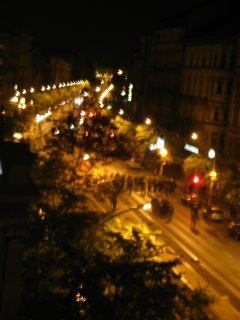 Got home, watched the rest on TV. Phoned my friend whose flat overlooks one of the flashpoints. It's his photo that's attached. As he described the battle below, the call was interrupted by the report of a gun going off, and he saw someone collapse. Amazing to think all these incredible scenes were just streets away.
Got home, watched the rest on TV. Phoned my friend whose flat overlooks one of the flashpoints. It's his photo that's attached. As he described the battle below, the call was interrupted by the report of a gun going off, and he saw someone collapse. Amazing to think all these incredible scenes were just streets away.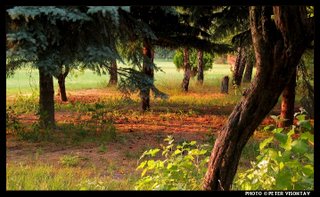
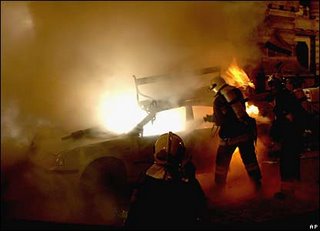 I'm all for less slick politicians and an end to tacit consent. If people were consistent, there’d be riots every day. Until the whole house comes crashing down.
I'm all for less slick politicians and an end to tacit consent. If people were consistent, there’d be riots every day. Until the whole house comes crashing down.


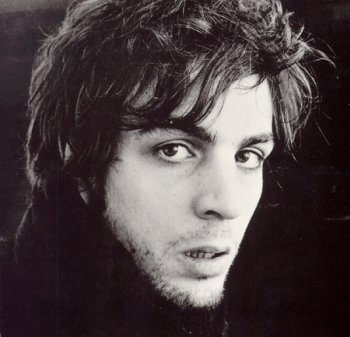


 Imagine your city without any cars just for a day, or even an afternoon. This is the idea behind Critical Mass, when thousands of cyclists take to the streets in a carnival atmosphere, and often with scant regard for the rules of the road. My earliest memory of this event was making wide arcs in the middle of Tottenham Court Road in London, reclaiming a street from its usual association with slavish Saturday shopping, for the delighted amazement of childhood. You could hear birds sing and a distant faint rushing sound was the only reminder of cars.
Imagine your city without any cars just for a day, or even an afternoon. This is the idea behind Critical Mass, when thousands of cyclists take to the streets in a carnival atmosphere, and often with scant regard for the rules of the road. My earliest memory of this event was making wide arcs in the middle of Tottenham Court Road in London, reclaiming a street from its usual association with slavish Saturday shopping, for the delighted amazement of childhood. You could hear birds sing and a distant faint rushing sound was the only reminder of cars. 